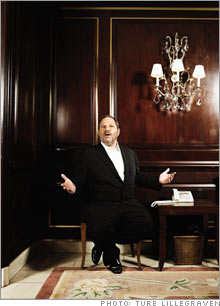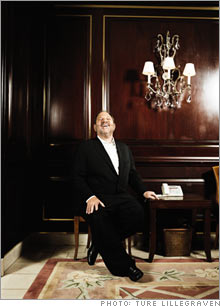Meet the new Harvey WeinsteinSince Harvey and his brother, Bob, launched the Weinstein Co. 20 months ago, he has focused on deals, not movies. Now investors want him to change, reports Fortune's Tim Arango.(Fortune Magazine) -- Wait until you see what is about to happen to you," says Harvey Weinstein, sitting in the back seat of a midnight-blue Peugeot, car No. 3 in a nine-vehicle motorcade. The procession is inching down La Croisette, the seaside boulevard that meanders through Cannes on the French Riviera. Tonight it is lined on both sides with fans hoping to catch a glimpse of celebrities en route to the premiere of Michael Moore's "Sicko." There is perhaps no more high-wattage event in the movie business than the Cannes Film Festival. During the 25 years Harvey and his brother, Bob, were building Miramax Films, they were fixtures here - and at the Academy Awards. Their movies picked up 60 Oscars, including Best Picture wins for "The English Patient," "Shakespeare in Love," and "Chicago." But the last time Harvey made a big splash in Cannes was three years ago with the premiere of "Fahrenheit 9/11." Since then the brothers have endured a nasty divorce from their former corporate parent, Walt Disney Co. (Charts, Fortune 500) , and then put up their own shingle, the Weinstein Co., with $1.2 billion of Wall Street's money. But they've yet to replicate their past success at wringing large profits from small movies, in part because Harvey had ambitions of conquering worlds beyond film. Therein lies the trouble.   Harvey wanted to be a media titan, the next Rupert Murdoch, staking claims to the Internet, cable television, and fashion. As the acquisitions piled up - aSmallworld (a MySpace for the jet set), a piece of the cable network Ovation, the remnants of the Halston fashion house - box office suffered. During that time the 55-year-old lost weight (cardio-boxing) and quit smoking (with the Allen Carr method). Now Fortune has learned that the Weinstein Co. board of directors has stepped up its oversight. The board is meeting nearly every month - as it did by teleconference on May 18 during the Cannes festival - and is searching for a top executive to run day-to-day operations. "This fiscal year has been a disappointing one," says Tarak Ben Ammar, the Franco-Tunisian dealmaker and film producer who sits on the Weinstein Co.'s board of directors and whose firm, Quinta Communications, owns 3.3% of the 20-month-old company. "But a company is not built in one fiscal year ... Maybe we need to bring in a high-level CEO, but we'd need somebody who would be compatible with the market and investors and the brothers." Several months ago Bob, who keeps a lower public profile and focuses on moviemaking, finally sat his older brother down for a heart-to-heart meant to nudge him back to the core business. "Bob just said, 'Come on, we can't, like, do this,'" Harvey says of the chat. "I said, 'I'm having a good time.' Bob said, 'Okay, Halston and all that sounds cool and everything, but you're a filmmaker, and people expect that of you.' I said, 'Bob, let me see someone break my [Oscar] record. I'll be the first to give them the cup. I'll be Bobby Hull passing the baton to Wayne Gretzky.'" So as the midnight-blue Peugeot stops at the edge of the red carpet, Harvey alights amid the staccato click-clack and flash bursts of hundreds of cameras. This is his chance to show Hollywood he can still be the agent provocateur of art-house film. It is his Michael Corleone moment: Just when I thought that I was out, they pull me back in. "I wanted to do something to challenge myself," he says. "I know how to make movies, and people think I know how to make movies, but I wanted to do something different." And now the gloves are off. Later in the week he walks into the premiere of Quentin Tarantino's "Death Proof" with a cellphone to his ear, sniping to a New York City gossip columnist about one of his directors, Luc Besson, who had publicly blamed the Weinsteins for the failure of his movie Arthur and the Invisibles. (Harvey's quote in the following day's Daily News about the French filmmaker was that "he's out of his mind " and is a "has-been.") Later that night in Cannes, Harvey comes barreling into the "Sicko" after-party. "I'm back," he announces. A month earlier, on Tuesday, April 10, the Weinstein Co.'s eight-member board of directors convened in the third-floor conference room at the company's headquarters in the New York City neighborhood of Tribeca for a regularly scheduled board meeting. It was the first time the full board had met in about six months, and it should have been a moment to crack open the champagne. "Grindhouse," the highly anticipated Quentin Tarantino-Robert Rodriguez double feature, had debuted the previous Friday. But then the weekend box office numbers came in: a paltry $11.6 million. For nearly ten hours the board scrutinized the company's disappointing box office and implored Harvey to turn his full attention to filmmaking. Ben Ammar says, "It was never a nasty board [meeting]. It was, 'Okay, Harvey, let's not let this get out of hand.' He immediately took the blame." In fact, so far the board has been forgiving, perhaps because when Goldman Sachs (Charts, Fortune 500) raised the equity, it doled out only relatively small chunks. The largest minority shareholders are the investment firms Fidelity and Wellington, which put in just $50 million each, for a 5.5% stake. The upshot is that the brothers, who hold 51% of the equity, are the ones with the most skin in the game. It wasn't just "Grindhouse" that came up short. The Billy Bob Thornton comedy "School for Scoundrels," a title produced by Bob Weinstein, was released last September and has brought in just $17.8 million at the domestic box office. The movie cost about $35 million to produce. "School for Scoundrels," according to one source close to the company, is projected never to make money. Most of the new company's movies have been profitable, even if they've failed to light up the box office. The film "Hannibal Rising," released by the Weinsteins through a deal with MGM, will make roughly $9 million in profit - profitable but below the $20 million originally expected. |
Sponsors
|
